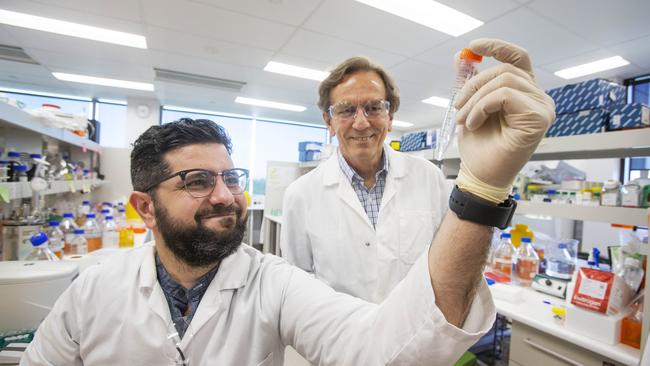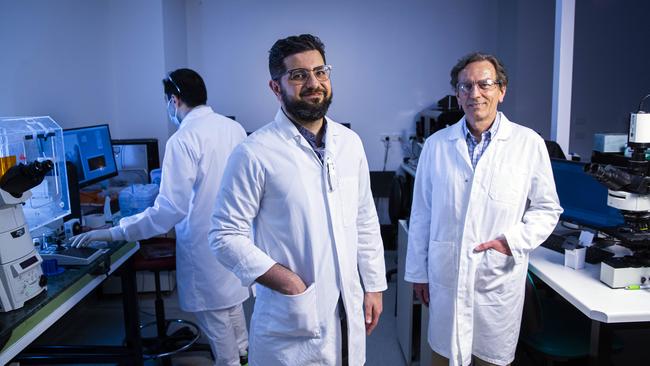The gene geniuses who’ll crush COVID-19 with mRNA vaccine
Vaccine science has achieved a historic feat. There’s never before been an mRNA vaccine licensed for use.

The announcement by pharmaceutical giant Pfizer this week that the vaccine it has developed with German drugmaker BioNTech appeared to protect nine out of 10 people from catching coronavirus places the world on the brink of an extraordinary scientific achievement.
The results of phase-three trials of the vaccine, dubbed BNT162, are interim, and they have not yet been peer-reviewed, but it now appears a near certainty the world will have a vaccine against COVID-19 that could be rolled out as soon as Christmas. Other successful vaccines will likely follow.
It’s no surprise the frontrunning vaccine is an mRNA candidate. Gene-based vaccine development has advanced significantly in recent years. The vaccines are quick to develop, and have a proven track record in cancer immunotherapy. But there’s never before been an mRNA vaccine licensed for use. COVID-19 has seen the vaccines trialled in humans on a massive scale, and the new vaccines on the block now seem set to transform vaccine science.
In contrast to traditional protein-based vaccines, which deliver an immune system-stimulating foreign substance to the body in an injection, gene-based vaccines instruct the body itself to make a toxin — known as an antigen. The messenger-RNA carries instructions to the body to make foreign substance — in this case the spike protein — which then gets exported from the cells. The body recognises this antigen as a foreign substance and mounts an immune response, producing antibodies and T-cells to fight the infection.
“I think we always thought that mRNA vaccines would be the first ones to get to this point because there’s some really significant advantages in terms of speed, and there’s plenty of safety data with similar products,” says Colin Pouton, a professor of pharmaceutical biology at Monash University.
“And to get to 90 per cent efficacy is probably higher than anyone’s expectation. The significance of it is that if you’ve got a vaccine that’s that good, then you don’t have to worry so much about how many people get vaccinated. It can really stop the spread.”
News of the stunning efficacy of the Pfizer-BioNTech vaccine comes as the COVID-19 crisis deepens in the US, as case numbers explode and hospitals reach capacity. A daily record of more than 143,000 new infections were diagnosed on Wednesday. Globally, more than 52 million cases of COVID-19 have been recorded — one-fifth of them in the US — with at least 1.28 million deaths worldwide.

US regulator the Food and Drug Administration is working overtime to fast-track the approvals process for the Pfizer-BioNTech vaccine, among others. Pfizer, which has so far inoculated more than 39,000 people in its phase-three clinical trial of BNT162, said this week it expects to provide the FDA with the required amount of safety data for emergency-use authorisation of the vaccine in less than two weeks.
Anthony Fauci, the US government’s top infectious disease expert, is bullish on the timeline. He said this week he expects doses of the Pfizer-BioTech vaccine to be available for the highest-risk individuals in the US some time in December.
Australia’s regulator remains in close contact with its counterparts at the FDA examining early scientific data from the Pfizer vaccine studies. The TGA’s head, John Skerritt, said this week he expects provisional approval for the Pfizer-BioNTech vaccine to be granted by late January.
Five million Australians are on track to be vaccinated in March. The federal government has agreements to purchase 125 million doses of three other vaccine candidates, too.
For the world to be poised to deliver the first doses of a COVID-19 vaccine by Christmas seemed unfathomable just six months ago. No vaccine had ever before been successful against a coronavirus. Many doubted there ever would be a successful vaccine, and only the most optimistic believed it might be delivered before the year was out. But those familiar with the newest developments in vaccine technology were more optimistic. The Pfizer-BioNTech mRNA vaccine is one of a new suite of immunisations that have never been licensed.
Those developing mRNA vaccines — there are almost 30 mRNA candidates in development around the world among a total of more than 230 vaccines in development — knew their technology was likely to win the race.
BioNTech’s quest to create an mRNA vaccine for COVID-19 began in January when immunologist Ugur Sahin, along with thousands of scientists worldwide, gained access to the DNA sequence of the novel coronavirus.
Sahin, founder of German drugmaker BioNTech, had a track record in gene therapy. The son of Turkish immigrants, his pioneering work creating RNA-based immunotherapies to treat cancer had springboarded him into the field of mRNA vaccines.
He knew the technology — never before licensed for use as a vaccine — provided the speediest path to a vaccine that could save the lives of those who would fall ill in a pandemic that he felt sure would kill millions, devastate global markets and send cities around the world into shutdown.
It took Sahin’s team a matter of weeks to create an mRNA vaccine. They knew from similarities with the original SARS virus from 2003 that the distinctive spike protein was the hook that the SARS-CoV-2 virus used to bind to receptors in a human cell and gain entry. They needed to replicate parts of the spike protein in a gene sequence that would instruct the body to make the antigen in its own cells, inducing an antibody response. Once the DNA sequence of the spike protein is created, mRNA is produced directly from the DNA, carrying the same gene sequence. The RNA must be extracted and purified, then mixed with a lipid solution to form lipid nanoparticles that package and protect the RNA. The process is extremely quick compared to making a traditional protein-based vaccine.
Despite the positive interim results from the Pfizer-BioNTech vaccine, many experts qualified their praise, cautioning that it’s unclear how well the vaccine will protect the elderly and the immuno-compromised.
“Because it’s a press release and not a detailed scientific report, we don’t really know exactly what the basis of the claim that it’s 90 per cent effective is,” says Lyn Gilbert, a clinical professor in immunology and infectious diseases at the Marie Bashir Institute for Infectious Diseases and Biosecurity at the University of Sydney. “The second thing is, to be really enthusiastic about this, we need to know what its efficacy will be in a whole range of different people.
“Usually, drug trials are done in fit healthy adults who have strong immune systems. Of course the people who are most at risk of severe COVID-19 or dying from it are elderly people and people with underlying illnesses. There’s no information I assume about its efficacy in that group. The other thing we don’t know is how long the protection will last and what the longer-term side-effects are.
“This vaccine is not certainly not the panacea. No vaccine is a panacea.”
It may not be a panacea, but the likely licensing of the world’s first mRNA vaccine will turbocharge the scientific development of gene-based vaccines, according to Archa Fox, an RNA biologist and associate professor at the University of Western Australia.
“I think it’s not an overstatement to say this is a new frontier in vaccine development,” Fox says. “This development is built on the basis of decades of research into understanding RNA, trying to figure out what RNA does in cells and how we can make it more stable so it doesn’t get broken down. That’s one of the key breakthroughs this technology relies on.”
Now an mRNA vaccine has been proven effective in large-scale clinical trials for COVID-19, it opens up huge possibilities for the technology in preventing the spread of other infectious diseases, says Brendan Wren, a professor of microbial pathogenesis at the London School of Hygiene and Tropical Medicine.
“The whole technology has been revolutionised in the last decade or so,” Wren says. “Without the COVID-19 pandemic, mRNA vaccines would not have been tested for humans, not at the scale they have been. That has significantly accelerated the platform technology.”
Scientists at the University of Pennsylvania Perelman School of Medicine believe that in coming years they will be able to produce a universal coronavirus vaccine to protect against the several other types of coronaviruses that cause illnesses, ranging from the common cold to the deadly Middle Eastern Respiratory Syndrome. They’re working on mRNA vaccines that could provide protection for scores of different viruses in one shot.
“We’ve had three coronavirus epidemics in the past 20 years,” Perelman School professor of medicine Drew Weissman said in a recent article in the Journal of the American Medical Association. “The next time this happens, we’ll have a vaccine already made, ready to be shipped out and used very quickly to prevent the pandemic from taking over.”
As this COVID-19 pandemic continues to wreak death and misery, the lives of countless people, as well as economies, depend on the speed at which a vaccine is delivered. An mRNA vaccine won’t be the only one, but it looks to be the greatest immediate hope.


To join the conversation, please log in. Don't have an account? Register
Join the conversation, you are commenting as Logout